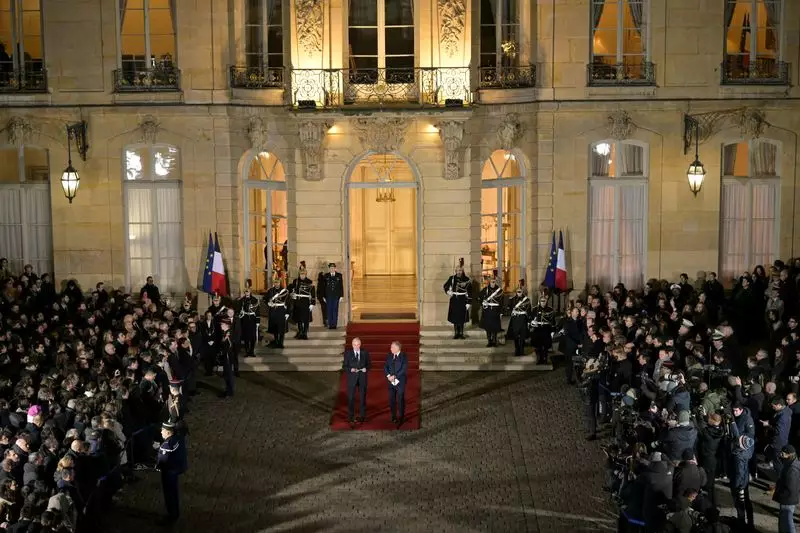Francois Bayrou’s appointment as prime minister marks a significant moment in French politics, showcasing the challenges of leading in a fragmented parliamentary landscape. Formerly an education minister, Bayrou’s return to frontline politics comes as President Emmanuel Macron’s fourth prime minister in a single tumultuous year. The question looms as to whether Bayrou can navigate the treacherous waters of a divided National Assembly, where alliances shift easily and parliamentary support is precarious at best.
Bayrou’s political history is rife with controversy and setbacks, including his previous experience attempting to increase private school subsidies which ignited widespread protests in the 1990s. Such historical precedents suggest that the seasoned centrist must tread carefully, balancing the needs of various factions within the parliament while also addressing the pressing issues the country faces.
The current political atmosphere presents a landscape fraught with hurdles. With a parliament characterized by ideological divides among the far-right, left-wing, and centrist factions, Bayrou will need to adopt an inclusive approach to governance. This dynamic was unsettlingly showcased with the ouster of Michel Barnier, Bayrou’s predecessor, when the parliament voted to remove his government—a move that had not occurred since 1962. Remarkably, this event appears to have elicited a mix of surprise and dread among lawmakers, emphasizing the volatile nature of contemporary French politics.
An immediate task for Bayrou will be to assemble a cabinet that can withstand the impending scrutiny of both allies and adversaries in the assembly. As he embarks on his mission to draft the budget for 2025, it’s clear that passing this legislation will require not just expertise but also an ability to forge reluctant coalitions. Arnaud Benedetti, a professor at the Sorbonne, aptly summarizes the current atmosphere by indicating that no vote of no-confidence is imminent, yet the underlying tensions remain.
A Balancing Act: Fiscal Responsibility and Political Survival
At 73, Bayrou carries the mantle of a seasoned politician with a pronounced commitment to address France’s fiscal crisis—a “moral problem,” as he recently described it. During his tenure, the nation’s debt has soared to alarming heights, prompting Bayrou to reiterate calls for a balanced budget while appealing for reconciliation among disparate political factions. His inclination towards “repairing” relationships may foster temporary allies, but the question of whether this will translate into effective governance remains to be seen.
The financial challenges are stark, forecasted with a budget deficit of 6.1% for 2024. Bayrou’s predecessor aimed to impose tax hikes on the wealthy and major corporations while curbing pension increases to mitigate this deficit. However, with Barnier’s government dismantled, these propositions now teeter on the edge of political oblivion, leaving Bayrou with the arduous task of potentially recalibrating or reviving these initiatives.
Complicating Bayrou’s agenda is a robust opposition movement. Leaders from both the far-right, exemplified by Jordan Bardella, and left-wing factions have indicated a willingness to rally against any budget strategies that do not align with their hardline stances. The contrast between these ideological positions could lead to a labyrinthine battle over fiscal policy as unions, political parties, and interest groups stake their claims on upcoming reforms.
Noteworthy is the poignant fact that even moderate reforms advocating pension indexing could escalate into a contentious standoff. Opinion polls indicating rising support for Marine Le Pen, the far-right leader, further exacerbate these tensions, hinting at a potentially disruptive political climate leading into the next presidential elections in 2027.
Francois Bayrou’s ascension to the premiership encapsulates a critical moment for governing France amidst chaos. With the burden of managing a fractious Parliament and addressing severe economic pressures, his capacity to foster collaboration or circumvent legislative gridlock will be pivotal. The trajectory of Bayrou’s leadership will be closely scrutinized, as his administration seeks to balance fiscal prudence with the necessity of social cohesion amid a politically charged environment.
As France prepares for a new chapter under Bayrou, the nation watches with bated breath, aware that the decisions taken—or avoided—by their leaders will resonate far beyond the parliamentary chambers, shaping the social and economic fabric of the country for years to come.

